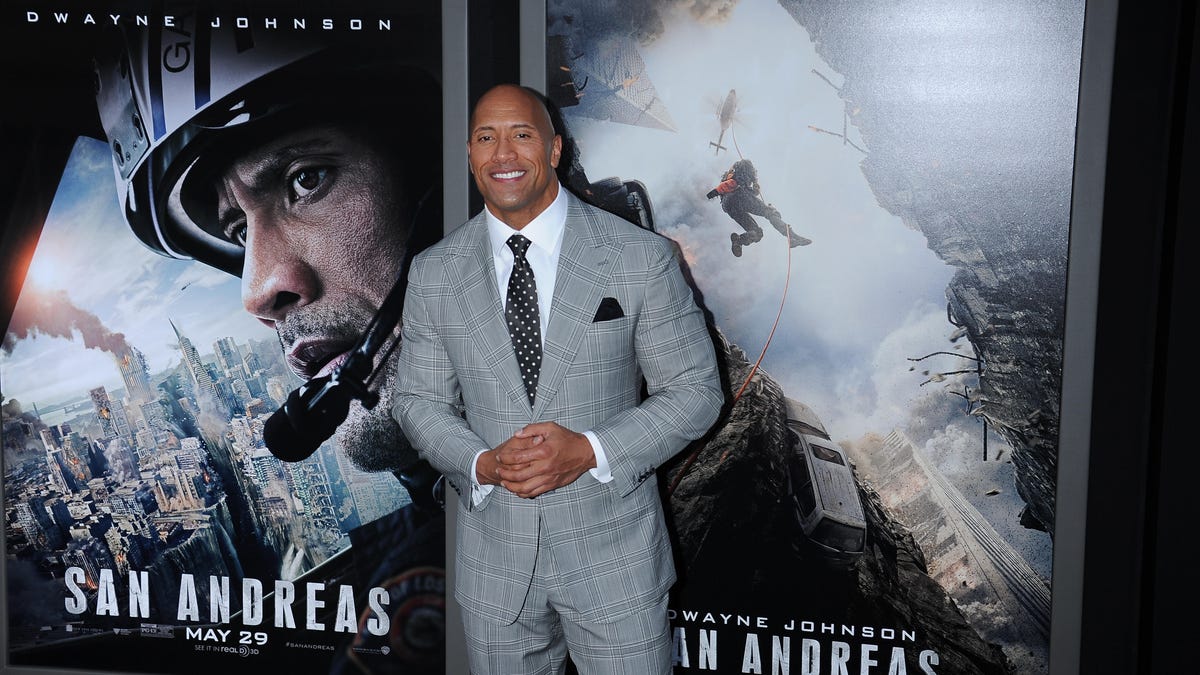How movies like Contagion and San Andreas can help us prepare for natural disasters
Disaster movies have a lot to teach us -- even the big spectacle ones with The Rock sweeping down from a helicopter.

Actor Dwayne Johnson attended the Hollywood premiere of San Andreas in 2015.
Back in March, when COVID-19 shelter-in-place orders were imposed in California, I realized it was the perfect occasion to finally watch Contagion. And if the story depicted on screen ever became reality, I'd want to be Matt Damon's character in the movie. Or his daughter's. They make it till the end mostly unscathed.
The 2011 film directed by Steven Soderbergh depicts a pandemic with a flulike virus very similar to the one we are facing today (but much more lethal). Damon's character turns out to be immune, but he makes sure his teenage daughter takes all the precautions not to catch it: isolation, mask-wearing, avoiding contact with others at all costs. I wasn't alone searching solace in Contagion, it became one of the most watched movies on iTunes.
It's just a movie, but I learned a lot about disease transmission and prevention from Contagion. Not for nothing -- it was praised for its scientific accuracy. It got me thinking: What else could we learn from natural disaster movies? There are movies that deal with earthquakes, like San Andreas or The Quake. Movies about tsunamis, like The Wave or The Impossible. We even have movies that feature the impact of climate change, like The Day After Tomorrow.
"Do we learn anything from them? Obviously not. I mean, Contagion was made some time ago," says Phyllis Nagy, head of screenwriting at UCLA's School of Theater, Film & Television. She also points out that when the 1974 film Earthquake was released, it didn't move the needle in terms of preparedness in California. "It was released in theaters with something called Sensurround. When you sat in the theater, you actually felt the earthquake."
"Hollywood's first job is to entertain people," says Ann Merchant, the deputy executive director at the office of communications of the National Academies of Science, Engineering and Medicine.
Merchant leads The Science & Entertainment Exchange, a program connecting filmmakers, producers and screenwriters with a database of more than 2,400 scientists and engineers.
"Even if you live in an earthquake-free kind of area," says Merchant, "you can get a sense of what it is to live through one, watching a movie where an earthquake takes place."
"Film and television are a form of accidental curriculum," she says.
The disaster movie tropes
Kathrine Thorborg Johansen in The Quake.
Nagy, who was nominated for an Oscar for her 2015 screenplay Carol, breaks the formula most natural disaster movies are built on. "Some people die. They die heroes and the protagonist of the movie lives," she says. "It provides a sense of comfort that there'll be a survivor. And you're the survivor of your own narrative."
Contemporary disaster movies can't be hopeless: "Earth and the people of the Earth have to survive. Even if the hero -- and this is a variation -- dies saving the world."
Nagy also believes disaster movies need to deliver on the "disaster."
"If it's an earthquake movie, there must be an earthquake. You need the spectacle," she says.
Think about the 2015 film San Andreas. The film starring Dwayne Johnson as a Los Angeles firefighter was indeed a spectacle, portraying several massive earthquakes that struck Los Angeles and San Francisco. But even with all the fallen skyscrapers, the movie didn't show the millions of deaths that would have resulted from such devastation. At the end of the day, The Rock's character reunited with his estranged wife, they rescued their daughter and found their happy ending.
The power of science
Merchant recognizes movies don't always get the science right but there are benefits to cinematic portrayals even if they contain scientific inaccuracies. Thomas Jordan, a member of the National Academy of Sciences, consulted on San Andreas. When the movie was released, Jordan was interviewed by several media outlets about the real science of earthquake safety. "It received national coverage," says Merchant. "He got his science out to an audience that might otherwise not have heard from him."
Silje Breivik and Kristoffer Joner in The Wave.
The Science & Entertainment Exchange launched in 2008, and they've consulted on around 3,000 film and TV properties, San Andreas and Contagion among them. The research shows that movies have an impact on the scientific ideas of the audience, and this program wants to take full advantage of that. "We're the National Academy of Sciences, we didn't start this program because it would be fun to go to Hollywood," she says. "We started this program because the literature search demonstrated the effectiveness of this strategy."
It wasn't a movie that finally pushed Nagy to get an emergency kit, though. It was a chat with a safety officer who explained what could happen during a +7.0 magnitude earthquake, especially for someone like her who was living in a high-rise building at the time.
After more than seven years living in the Bay Area, I still don't have an emergency kit. I've been meaning to get one for the whole seven years.
The many natural disaster movies I watched and rewatched during lockdown have taught me about the need for them and so much else. Whether it's earthquakes, hurricanes or tsunamis, you need to be aware of the particular perils of where you live. Get travel insurance, have an evacuation plan, choose an out-of-state contact, take a first aid class. And I can't stress this enough, definitely learn how to swim if you haven't.
Because at the end of the day, as Merchant says: "I don't think anyone thinks that The Rock is going to sweep down in a helicopter and pull us out of a yawning chasm to save us."
Pity.

